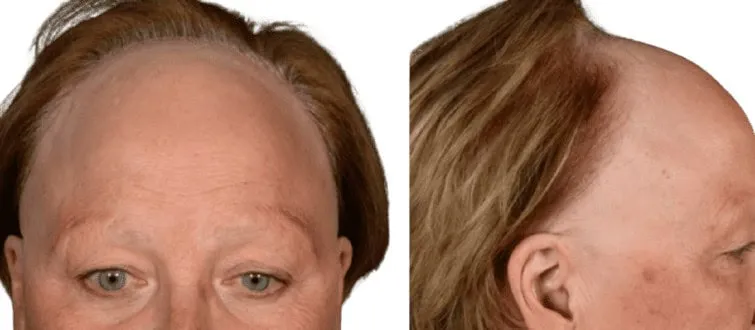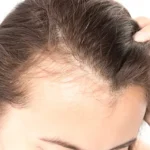Is frontal fibrosing alopecia an autoimmune disease?
If you’ve noticed an unexplained receding hairline, eyebrow thinning, or scalp inflammation, you might be wondering, Is frontal fibrosing alopecia an autoimmune disease?
You’re not alone in seeking answers. Frontal fibrosing alopecia is a type of hair loss that primarily affects the frontal hairline and eyebrows. While the exact cause of FFA remains unclear, research strongly suggests an autoimmune connection. Understanding the potential autoimmune link in FFA is essential for early diagnosis and proper treatment. At Dr. Uzma Irfan Hair Transplant Clinic in Islamabad, we specialize in diagnosing and treating FFA, offering a range of solutions tailored to individual needs.

What Is Frontal Fibrosing Alopecia?
Frontal fibrosing alopecia (FFA) is a type of scarring alopecia characterized by progressive hair loss that starts at the frontal hairline and can spread to the temporal regions. While it often begins in postmenopausal women, it can also affect men and younger women. Along with hairline recession, FFA can cause thinning or complete loss of eyebrows, eyelashes, and other body hair. This form of hair loss can be distressing, as it impacts both physical appearance and self-esteem.
Is Frontal Fibrosing Alopecia an Autoimmune Disease?
One of the most common questions asked by individuals diagnosed with FFA is, “Is frontal fibrosing alopecia an autoimmune disease?” While the exact cause of FFA is still not completely understood, research suggests that there could be an autoimmune connection. In autoimmune diseases, the immune system mistakenly attacks the body’s own tissues. In the case of frontal fibrosing alopecia, it is believed that the immune system attacks hair follicles, leading to inflammation and scarring, which results in hair loss.
Studies have shown that individuals with FFA are more likely to suffer from other autoimmune disorders, such as hypothyroidism, vitiligo, and rheumatoid arthritis. This has led many researchers to suggest that frontal fibrosing alopecia may be classified as an autoimmune disease. However, more research is needed to confirm this link definitively.
Symptoms of Frontal Fibrosing Alopecia
Another reason why people ask, “Is frontal fibrosing alopecia an autoimmune disease?” is due to how it presents. Common symptoms include:
- Hairline Recession: Gradual hair loss starting at the frontal and temporal hairlines.
- Eyebrow Thinning: A noticeable reduction in eyebrow density or complete loss.
- Scalp Inflammation: Redness, itching, or discomfort on the scalp where hair loss is occurring.
- Other Body Hair Loss: In some cases, FFA affects other areas of the body, including eyelashes and body hair.
If you’re noticing these symptoms, it’s crucial to consult with a professional who can provide an accurate diagnosis and treatment plan.
Treatment Options for Frontal Fibrosing Alopecia
While there is currently no permanent cure for FFA, multiple treatments can slow its progression and improve quality of life. Understanding “Is frontal fibrosing alopecia an autoimmune disease?” helps tailor the treatment approach.
Topical Treatments
Corticosteroids and calcineurin inhibitors can help reduce scalp inflammation and slow the progression of hair loss. These treatments are often applied directly to the affected areas to target the immune response.
Systemic Medications
Oral medications such as hydroxychloroquine or finasteride are sometimes prescribed to control the inflammatory processes. These medications can be effective for reducing symptoms and preventing further hair loss.
Hair Restoration Surgery
In cases where the condition is stable and hair loss has been managed, hair restoration surgery, such as Follicular Unit Extraction (FUE), may be an option to restore hair. However, it’s essential that the disease activity has stabilized before considering surgery.
Platelet-Rich Plasma (PRP) Therapy
PRP therapy is a non-invasive treatment that uses the patient’s own blood to stimulate hair growth in areas with thinning hair. It can help promote healing and follicular regeneration, making it an option for those in the early stages of FFA.

Why Choose Dr. Uzma Irfan Hair Transplant Clinic in Islamabad?
When patients ask, “Is frontal fibrosing alopecia an autoimmune disease?”, they need answers backed by clinical experience. Dr. Uzma Irfan, a board-certified hair restoration surgeon (ABHRS, ISHRS), has over a decade of experience treating various types of hair loss.
Our clinic offers personalized, compassionate care for every patient, ensuring that treatment plans are tailored to meet your unique needs. Whether you’re dealing with scarring alopecia or other forms of hair loss, we utilize the latest, minimally invasive techniques for the best possible outcomes.
Book Your Consultation Today
If you are experiencing symptoms of frontal fibrosing alopecia, it’s crucial to seek professional care as early as possible. At Dr. Uzma Irfan Hair Transplant Clinic, we specialize in diagnosing and treating FFA with a combination of advanced medical treatments and surgical options.
Contact us today to schedule a consultation with Dr. Uzma Irfan. Let us help you regain your confidence and restore your hair with personalized treatment options.
Frequently Asked Questions (FAQs)
Q1: Can frontal fibrosing alopecia be prevented?
A1: While there’s no known prevention for FFA, early diagnosis and treatment can help manage symptoms and slow progression.
Q2: Is frontal fibrosing alopecia an autoimmune disease??
A2: While not directly inherited, some individuals with a family history of autoimmune disorders may have a higher risk of developing FFA.
Q3: How is frontal fibrosing alopecia diagnosed?
A3: Diagnosis typically involves a physical examination, medical history, and sometimes a scalp biopsy to assess the extent of follicular inflammation and scarring.
Q4: What treatments are available for frontal fibrosing alopecia?
A4: Treatment options include topical steroids, systemic medications, and hair restoration surgery. Your treatment plan will depend on the stage of the condition and individual needs.
Final Thoughts
So, let’s return to the question: Is frontal fibrosing alopecia an autoimmune disease? While the answer isn’t definitive, growing scientific evidence and clinical experience suggest that autoimmunity plays a major role. By recognizing this connection, patients can pursue timely, targeted treatments.
If you’re still unsure and continue to wonder, “Is frontal fibrosing alopecia an autoimmune disease?”, a proper diagnosis and personalized plan at Dr. Uzma Irfan Hair Transplant Clinic in Islamabad can make all the difference. We’re here to support you every step of the way.
Book your consultation with Dr Uzma Irfan in Islamabad today to take control of autoimmune-related hair loss.
Follow us on Facebook, Instagram, and YouTube for expert insights and real patient stories.






